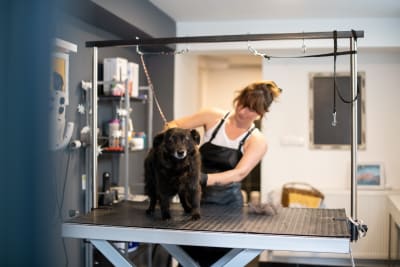There are a few requirements needed to become a veterinarian in Colorado. Interested candidates will find these requirements carefully outlined in the guide below.
Naturally, most of these steps are similar to the general steps applicable to aspiring veterinarians nationwide. At the same time, some of them are more peculiar to the state of Colorado.
Some are also voluntary and depend on possible specializations down the line. Regardless, all of these are what future veterinarians in the state must know before starting their journey.
Equally as important is understanding the need to attend only accredited programs. Again, the guide below also contains a list of some of the most prominent options to consider.
How to Become a Veterinarian in Colorado
The following are the critical steps to starting a career as a veterinarian in Colorado.
Step 1: Prepare for High School
Aspiring veterinarians in Colorado may start preparing for a veterinary career right from high school by focusing on relevant topics such as biology and physical sciences. Keeping good grades and a high GPA also makes college admission easier.
Step 2: Complete Undergraduate Studies
Veterinary colleges require an undergraduate degree before admission can be granted. Not only must candidates choose the right college to attend the most, but they must also select the right college program to study.
The safest bet is to pursue biology, chemistry, biochemistry, or animal science degrees.
Candidates will also improve their appeal to veterinary schools by taking on leadership roles and improving their communication and interpersonal skills during college.
Most veterinary schools will also ask for letters of recommendation before granting admission.
Step 3: Enter into Vet School
To become a veterinarian in Colorado, candidates must secure admission into a veterinary school accredited by the American Veterinary Medical Association. During their time in vet school, students will learn topics that will qualify them to seek employment in their relevant area of specialization.
Those who complete veterinary school will graduate with a Doctor of Veterinary Medicine degree. During the final year of vet school, aspiring veterinarians in Colorado must sit for and pass the North American Veterinary License Examination (NAVLE).
Step 5: Specialization
Veterinarians all have a general knowledge of how to take care of and administer treatment for animals. However, most also choose to specialize further by completing a residency in a specialty area that appeals to them.
Among the popular areas of specialization in veterinary medicine include small animal, large animal, and mixed practice veterinary medicine. The exotic animal and equine veterinary medicine field is also becoming increasingly popular.
Explore other careers with similar paths:
Top Veterinary Schools in Colorado
The following are some of the top accredited veterinary schools in and around Colorado.
Colorado State University
Denver, CO Online + Campus
Colorado State University is one of the few accredited veterinary schools nationwide. Having existed for more than a century, the school boasts highly qualified instructors and continually ranks among the best in the country and the world.
Tuition
$12,896 - $33,752Contact
(970) 491-6909
admissions@colostate.edu
Kansas State University
Manhattan, KS Online Only
Aspiring veterinarians in Colorado looking for an out-of-state option may also consider the program offered by Kansas State University’s College of Veterinary Medicine. Here, they will receive top-class education and become versatile in all the critical areas needed to start a successful veterinary career anywhere in the country.
Tuition
$11,876 - $28,348Contact
(785) 532-6011
registrar@k-state.edu
Consider exploring Veterinarian schools in neighboring states:
Licensure & Certification Requirements
The requirements for veterinary practice in Colorado involve paying a licensing fee that tends to vary. For this reason, candidates are advised to consult the Colorado State Board of Veterinary Medicine to keep up with current fees.
Colorado state veterinary license lasts 2 years and requires 32 hours of continuing education to renew. The state does not offer temporary licenses and does not have reciprocity agreements.
Candidates should be prepared to send in their transcripts and proof of graduating from an AVMA-approved college of veterinary medicine.
Salary & Career Outlook
With an annual average salary of $117,268, veterinarians in Colorado take home virtually the same average as the rest of the country. Of course, it is possible to go above or beyond this number, depending on a few optimizable criteria, some of which include experience, location, and the establishment of employment.
Those who have optimized these factors tend to fall into the top 10%, where the annual average salary is $177,873, while those who are starting may fall into the bottom 10%, where the average yearly salary is $77,312.
Sorting strictly by location, Aurora is the highest paying city to be a veterinarian in Colorado, with an annual average salary of $266,013. This is followed by Eads, Lakewood, and Fort Collins, with average yearly wages of $142,302, $136,840, and $124,253, respectively.
Westminster is the fifth highest-paying city for veterinarians in Colorado, with an average annual salary of $122,761. Denver follows this at 6th with an average yearly wage of $120,231.





